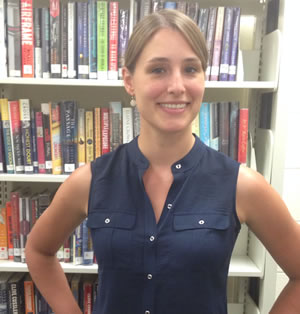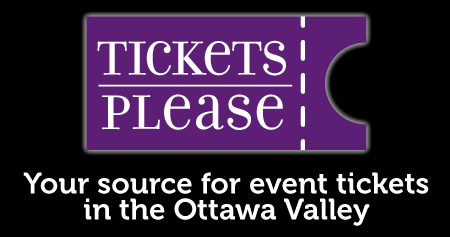August 2014 Speaking Volumes by Ottawa Valley Librarians
To read more articles and reading suggestions by our area's librarians, return to the Speaking Volumes main page.
Meriah Caswell, Manager of Library Services, Carleton Place Public Library

As the new CEO of the Carleton Place Public Library, Meriah Caswell has been working to develop new and innovative library programs and collections. When she isn't busy matching the perfect book to its reader, you can find her on her Pakenham hobby farm caring for a flock of surly chickens and attempting to keep the weeds out of her garden. She spends the rest of her free time running, reading, and dreaming of taking her canoe out on the water.
Online Exclusive: Meriah's summer reading picks for for kids and adults.
Your Books, Your Library, Your Community
If you want to know a community, take a look at its library collection.
Some will tell you to take a look at the state of the main street, or to count the bookstores. I have even heard that the local shoe store can tell you a lot about the place you are in. Ask a librarian though, and she will tell you how to gain a deep understanding of the people who live, work and grow in a community. Take a look at the shelves — the clues are all there. The dog-eared romance novels in the corner, the picture books jam-packed on waist-high shelves, the burgeoning section of crafting books, and even the picked-over “for sale” table. These subtle hints give away much about the fabric of a community — from the hobbies and interests, to its insecurities and guilty pleasures.
How, you ask? The answer is simple: library staff have worked hard to keep their fingers on the pulse of the community, and have tailored the library collection to meet its needs. Most librarians will know intimately the community they serve. They have scoured the Statistics Canada website, and know, for example, that there is a hidden 5% of the town that speaks German. A librarian has likely looked at the school curriculum and knows that Mrs. Walker’s grade five class will be studying bridges in January. A librarian will make it her business to know these things, because this knowledge will allow her to better tailor the collection to the community it serves, making that library all the more relevant and useful to its citizens.
Your librarians are also sensitive to the reading interests of her patrons. When purchasing new materials, many titles are easy. James Patterson, Nora Roberts and David Baldacci are authors that are sure to have waiting lists on their newest titles, and your librarian likely has them on standing order. Many librarians will remember that you raved about the last book an obscure fantasy author had written, and will make sure the newest book by that author is ordered for you the next time you come in. Most will also know that, while not many people talk about those new risqué romance titles, they are some of the highest in circulation, and that new hot title should be ordered as soon as it is available.
Developing a library collection, however, is not all about finding the perfect book for its reader. There is a darker side to librarianship. The side we don’t like to talk about. The thing is, once a library has filled its shelves with all those wonderful books, soon those shelves cannot be packed any further. White pages begin to yellow, hot topics become yesterday’s news, and current information turns from dated to incorrect and, if kept long enough, to hilariously (or insultingly) outmoded (for examples of this, check out awfullibrarybooks.net).
People who have read the hottest title are loathe to read it again, and soon the book featuring a busty damsel with hot pants and a scrunchie on the cover has been sitting on the shelf for years without a reader. These books must be moved in order to make room for those that the community currently wants to read. The process of finding these books and separating them from the ones that are in demand has been euphemistically dubbed “weeding”, and is an important part of keeping a collection current and relevant to a community. Library staff will rely on a variety of methods to determine what should be pulled, with circulation statistics being the main indicator. Books that are “weeded” often find new life on the “for sale” table, and many libraries will donate their used items to charitable organizations.
At the Carleton Place Public Library, much of our weeded material is donated to Better World Books, who will match each online book sale with a donation of a book to someone in need.
So the next time you’re in the library, put your detective hat on and take a look around. You may learn more than you expect!
Meriah's Picks: Summer reading
To pick up any of these titles, check your local library or enquire about inter library loan.
For kids
- Parts by Tedd Arnold
- Stanley's Party by Linda Bailey
- Tales of a Fourth Grade Nothing by Judy Bloom
For adults
- Bird Box by Josh Malerson
- Hotel on the Corner of Bitter and Sweet by Jamie Ford
- Ready Player One by Ernest Cline




